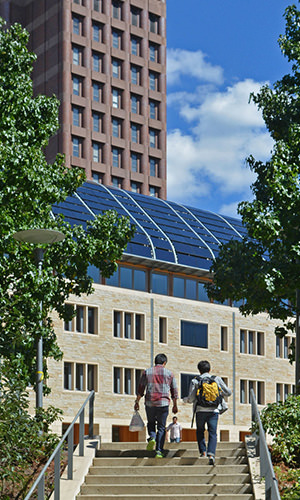Yale students spent the fall semester taking a deep dive into Yale’s campus sustainability planning. A course led by Professor Brad Gentry through the School of Forestry & Environmental Studies (F&ES) addressed the guiding question recently put forth by President Salovey: Is Yale’s current sustainability plan ambitious enough?
“We were charged to evaluate Yale’s current sustainability strategic plan, assess its robustness, and make recommendations for improvement in areas where we thought it was lacking,” said Dawn Henning, a Second-Year Masters of Environmental Science Candidate at F&ES.
Five student teams – which focused on land and water, materials, health and food, transportation, and energy – spent the fall semester taking a critical look at the current Yale Sustainability Strategic Plan. Students researched best practices, met with a broad range of stakeholders to learn about existing initiatives and discover new opportunities, and developed suggestions to expand on the University’s current sustainability efforts.
The course was modelled after a previous class taught by Gentry, which assessed stormwater management at Yale and led to the production of Yale’s current Sustainable Stormwater Management Plan.
The hands-on, practical nature of Gentry’s classes provides students with opportunities to participate in project implementation at the University, with involvement ranging from the creation of urban meadows and rain gardens to research related to sustainability planning.
“Participants in the course were from multiple schools – including F&ES, SOM, Public Health, and Yale College – and so we were able to bring a range of experience to the table from our professional backgrounds and studies,” said Henning. “Tapping into our collective resources allowed us to identify some of the successes and shortcomings of Yale’s sustainability programs, and suggest paths for progress and alternative solutions.”
Key areas of focus identified by the students include: the potential adoption of the Planetary Boundaries framework; improved networks and broader stakeholder engagement in regard to faculty research, student involvement, and the City of New Haven; and increased knowledge creation and dissemination.
Yale’s Sustainability Advisory Council – a faculty-led group responsible for strategic oversight of the University’s sustainability efforts – intends to take into account the students’ assessment in future discussions of campus sustainability.
As the Office of Sustainability works to develop Yale’s sustainability goals beyond 2016, comprehensive engagement with campus stakeholders will allow the planning to benefit from the University’s collective knowledge.
“We were excited to be brought into the planning process,” said Abigail Carney, a senior in Yale College. “University sustainability planning needs to be an inclusive process that takes into account the opinions and needs of students, faculty, staff, and the New Haven community – all of whom have a stake in the matter.”
The students presented their findings to faculty, administrators, the Office of Sustainability, operational staff, and students on December 8, 2014.